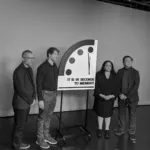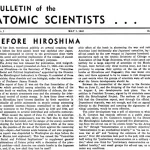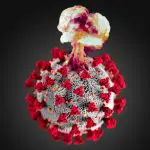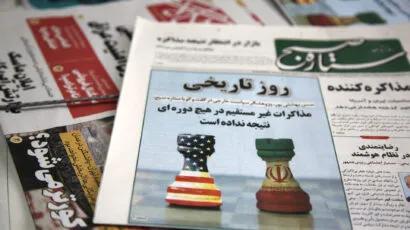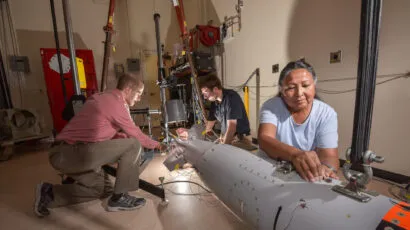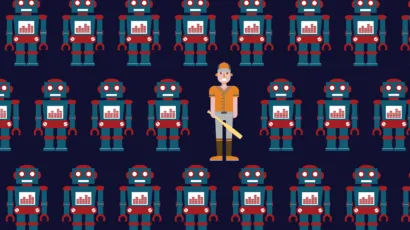A statement on the bombings of Hiroshima and Nagasaki
By Science and Security Board | August 6, 2020
 Photo by Eva Hambach (AFP)
Photo by Eva Hambach (AFP)
Seventy-five years ago this month, the United States used the most powerful weapons developed until that time to attack the cities of Hiroshima and Nagasaki. Because the atomic bombings caused such extraordinary damage amid an already-disrupted wartime Japan, the number of people who died as a direct result of the attack can’t be pinpointed. Initial US military estimates placed the immediate death toll at 70,000 in Hiroshima and 40,000 in Nagasaki. Later independent estimates suggest that 140,000 people died in Hiroshima and 70,000 were killed in Nagasaki.
The weapons dropped on Hiroshima and Nagasaki had the power of 15,000 and 21,000 tons of TNT, respectively. As heart-wrenchingly evidenced in the displays of the Nagasaki Atomic Bomb Museum and the Hiroshima Peace Memorial Museum, the magnitude of the calamity caused by those indiscriminate weapons—weapons that instantly vaporized those close to ground zero, sometimes leaving nothing but shadows on pavement—is all but impossible to comprehend.
Since World War II, no country has again used nuclear weapons in war. But the nuclear genie is out of the bottle, and the risk of nuclear catastrophe remains. Genies have only mythical powers born of fantasy; nuclear weapons are very real instruments of destruction. The fantasy about nuclear weaponry—the fiction that has kept the nuclear disarmament movement from making significant progress—springs from the deluded notion that more and “better” nuclear weapons provide more safety and security.
A week after the atomic bombing of Hiroshima and Nagasaki, J. Robert Oppenheimer—director of the Los Alamos Laboratory, which developed the bomb—wrote to Secretary of War Henry L. Stimson on behalf of a committee tasked with examining the future of nuclear energy and nuclear weapons. Oppenheimer outlined four concise points for Stimson: more powerful weapons could be developed; there were no effective military countermeasures that could prevent the delivery of atomic weapons; US atomic hegemony was not assured, and even if it could be, such hegemony could not protect the United States from terrible destruction; and the safety of the United States lay in the prevention of future wars, rather than in its ability to inflict damage. This last point is key and deserves to be quoted in full:
We believe that the safety of this nation—as opposed to its ability to inflict damage on an enemy power—cannot lie wholly or even primarily in its scientific or technical prowess. It can be based only on making future wars impossible. It is our unanimous and urgent recommendation to you that, despite the present incomplete exploitation of technical possibilities in this field, all steps be taken, all necessary international arrangements be made, to this one end.
Oppenheimer, a physicist who had just successfully created a weapon of mass destruction, was advocating diplomatic solutions to make such weapons irrelevant. Seventy-five years later, we know the following: Science did produce more powerful weapons but, as Oppenheimer predicted, no effective military countermeasures. Eight other countries also acquired nuclear weapons, erasing US hegemony.
And now, thousands of nuclear weapons—almost all of which are many times more powerful than the bombs that destroyed Hiroshima and Nagasaki—remain on high alert around the world. The United States and Russia possess more than 90 percent of those weapons, and a nuclear war between those superpowers would kill millions and perhaps billions of people, essentially ending civilization.
And so, on this awful 75th anniversary, the Doomsday Clock stands at 100 seconds to midnight. The Science and Security Board calls on all countries to reject the fantasy that nuclear weapons can provide a permanent basis for global security and to refrain from pursuing new nuclear weapons capabilities that fuel nuclear arms races. Rather than new weapons for new nuclear missions, new delivery systems such as hypersonic glide vehicles, or a resumption of nuclear testing, the United States, Russia, and the world’s seven other nuclear powers should set their technical sights on achievable milestones along the path toward arms control and eventual nuclear disarmament.
There are those who claim that putting the nuclear genie back in its bottle is impossible, because the information and technology needed to produce a nuclear bomb is too widely available. But the key to producing nuclear weapons has been and remains the acquisition of the fissile material—highly enriched uranium and plutonium—used in nuclear weapons. The means to track, locate, and secure these materials is within human capability, with the right application of financial and political will and resources.
The final hurdles on the path toward reducing nuclear arsenals and eventually eliminating nuclear weapons entirely will be political rather than technical. As the COVID-19 pandemic has made clear, solving major global problems requires international cooperation—and national leaders willing to seek it through verifiable global agreements and strengthened international institutions.
Seventy-five years after the first use of nuclear weapons and the founding of the Bulletin of the Atomic Scientists, we—all the members of the Science and Security Board—pledge to redouble our efforts to bring about a world in which the use of nuclear weapons is both unthinkable and impossible. On this tragic anniversary, we ask political and military leaders around the world to join us—to demonstrate that nuclear weapons do not create safety or security, but diminish them and threaten humanity’s future. With the fantasy that they are useful dispelled, nuclear weapons may come to be viewed for what they are—a costly and dangerous detour from the path toward real global security.
Together, we make the world safer.
The Bulletin elevates expert voices above the noise. But as an independent nonprofit organization, our operations depend on the support of readers like you. Help us continue to deliver quality journalism that holds leaders accountable. Your support of our work at any level is important. In return, we promise our coverage will be understandable, influential, vigilant, solution-oriented, and fair-minded. Together we can make a difference.
Keywords: Hiroshima and Nagasaki, Science and Security Board, arms control, disarmament
Topics: Hiroshima & Nagasaki, Nuclear Weapons
Share: [addthis tool="addthis_inline_share_toolbox"]
